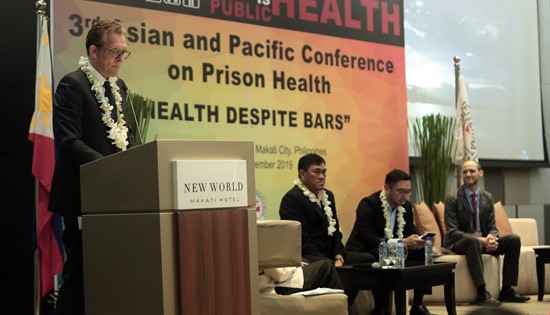|

“To
break the cycle of poor health outcomes in prisons, we need
to go beyond curative care and examine the inmates’ living
conditions. We must look at prison health care from all
angles. We must consider prison health as a public health
issue if we are to break that cycle,” said ICRC Head of
Delegation Boris Michel in his opening remarks. In photo are
(from left) Philippine Interior and Local Government
Undersecretary Nestor Quinsay, Philippine Justice
Undersecretary Deo Marco, and Thomas Hiatt, technical
officer of the World Health Organization. |
Health despite
bars: Asia-Pacific region tackles state of prison health
By
ICRC
November 13, 2019
MANILA – With the
Asia and Pacific region having over four million prisoners – the
highest in the world according to the latest World Prison Population
List – tackling the need for quality healthcare among detainees is
as complex as it is critical.
“Prisoners deserve the
same standards of healthcare as are available to the community, as
well as access to health services without discrimination. But often,
the inmates’ health needs cannot be fully met due to challenges in
the coordination among authorities concerned, lack of coherence in
policies and procedures, inadequate health staff and facilities,
among other reasons,” said Dr. Ziad Tohme, who works with the
International Committee of the Red Cross (ICRC) as a regional
specialist looking into the health-care needs in detention
facilities in Asia and the Pacific.
Poor living conditions in
many prisons across the world adversely impacts the health of
inmates, worsening their pre-existing ailments or leading to new
health concerns in prisons.
“Tuberculosis and other
communicable diseases are significantly prevalent in prisons, and
may spread to the community through staff, visitors and released
prisoners who received inadequate treatment. Curative care must be
supported by improving food and nutrition, water, sanitation and
having activities for better health. It’s also critical to recognize
that prison managers and other staff are just as responsible for
prisoners’ health,” Dr. Tohme said.
To support authorities in
the region strengthen their prison health systems for the benefit of
inmates, jail staff and communities at large, the ICRC organized the
third Asian and Pacific Conference on Prison Health (APCPH) from 13
to 15 November 2019 in Manila, Philippines.
Titled “Health Despite
Bars”, the conference provides a platform to health and detention
authorities, academics and public health experts, to share research
and best practices, as well as challenges. The conference also aims
to:
- promote a
whole-of-government approach to prison health;
- increase awareness of
international standards;
- encourage participants
to be active members of the worldwide prison health research and
engagement network.
Around 150 participants
involved in prison health from 21 countries will discuss topics such
as health needs of women and other vulnerable groups, mental health
and drug addiction, international standards for prison health.
As a result of the
conference, it is hoped that the participants will help improve the
health outcomes of detainees through effective management and
coordination, promote respect for fundamental rights protecting all
detainees, and implement related standards and principles (including
“equivalence of care”), contributing to a healthier society.
“We’re all involved in
providing care to people in custody. Coming to a conference allows
us to find out what’s working in some places, what’s not working so
well… share our experiences. The reason why we’re all here is to
improve care for people who are in detention. We are all passionate
about that and so if we can learn from each other that can improve
the care of people in custody, that’s a great thing,” said
participant Fiona Montroy, clinical nurse consultant of Justice
Health and Forensic Mental Health Network in New South Wales,
Australia.